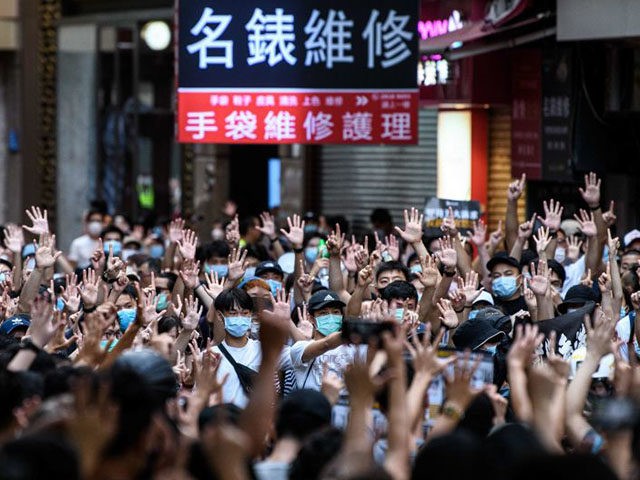Hong Kong’s Education Secretary Kevin Yeung sent a letter to the city’s pre-schools urging them to pressure kindergartners to embrace Chinese “national identity,” the local broadcaster RTHK reported Friday.
Yeung’s letter followed over a year of protests against China’s increasingly brazen violations of the autonomy of Hong Kong. Under the “one country, two systems” policy adopted after the United Kingdom gave Hong Kong up in 1997, the Communist Party has no authority to impose laws on Hong Kong. In turn, Hong Kong cannot declare sovereignty or act as a state. Yet dictator Xi Jinping has increasingly attempted to impose repressive communist laws on the state, first through a legislative bill allowing the extradition of anyone present in Hong Kong to China.
When protests caused the bill to fail in the Legislative Council, Beijing’s National People’s Congress illegally passed a “national security” law granting the Communist Party the ability to imprison someone for a minimum of ten years for crimes such as “secession” and “subversion of state power.” The law effectively does what the extradition bill would have — allow China to imprison anyone in Hong Kong in the Communist Party system.
The attempt to impose the extradition bill launched some of the biggest protests in the history of the city, attracting at their peak two million of Hong Kong’s 7 million people. The protests aligned with a historic drop in the number of people who identify as Chinese or openly express fealty to Beijing.
In light of that political and cultural rejection of communist China, Yeung urged those teaching young children to indoctrinate them into loyalty to the regime.
“In a letter sent to all pre-schools ahead of the start of a new school year, Yeung said teachers should take gradual steps towards helping young children build their Chinese identity,” RTHK reported, “and understand the Chinese culture like filial piety through activities like story telling and singing of nursery rhymes.”
“In a separate letter to all primary and secondary schools,” RTHK detailed, “the education chief called on teachers to serve as role models and teach students how to express themselves in a peaceful, legal and rational manner, while respecting the views of other people.”
Yeung has been at the forefront of pro-China Chief Executive Carrie Lam’s efforts to ensure that younger Hongkongers do not rebel as loudly against communism as those who are young adults today. In July, Yeung warned schools not to allow anyone to sing “political” songs, meaning the many protest anthems that have become popular among anti-communists.
“No one, including students, should play, sing, and broadcast songs which contain political messages or hold any activities to express their political stance,” the education secretary wrote. Yeung specifically identified the unofficial anthem of the protests, “Glory to Hong Kong” as a problematic song because it was linked to “violent and illegal acts.”
The Chinese Communist Party has spent months attempting to frame the Hong Kong protest movement as senseless violence perpetrated by thugs, going as far as to compare riots in the United States perpetrated by leftists ideologically aligned with China to the anti-communist Hong Kong protesters. While violence has occurred at protests in Hong Kong, it has largely been at the hands of police and pro-China thugs with ties to the “triad” organized crime syndicates that inhabit the city.
In June, Yeung explicitly told school administrators to punish “dangerous and unlawful” activities in the aftermath of the passage of the “national security” law. Yeung defined “violent” behavior as “chanting slogans, forming human chains, and posting slogans or singing songs which contain political messages.”
The “national security” law bans four alleged “crimes” in Hong Kong: incitement to foreign interference, acts of secession, “subversion of state power,” and “terrorism,” failing to offer specific elements of any of the four crimes. Anyone found guilty of one of these crimes must serve a minimum of ten years in prison.
To prevent running afoul of the law, Hong Kong schools and libraries have begun censoring their book collections, screening books for anything that can be interpreted in any way as a violation. For context on how broad the law’s mandate is, police arrested a man under the “national security” law in July for wearing a Liverpool soccer shirt, claiming that wearing anything British was a clear call for “foreign interference.”
Yeung’s Education Bureau told teachers and librarians in July to do away with “outraged content or content that may concern the four aforementioned offenses.” The result of the mandate was that many books not of a clear political character also disappeared from access for students while administrators reviewed them.
On Tuesday, a group of Hong Kong teachers sent a letter to Yeung urging an end to censorship of any books or other education materials that have a valid place in their curricula.
“We express our strong dissatisfaction and request the Education Bureau to withdraw the political review and deletion of general education textbooks,” the letter asserted. “Not only is it completely inconsistent with the Education Bureau’s claims of ‘improving the quality of textbooks’ and ‘implementing the aims and objectives of the curriculum,’ it is more apparent that political censorship is introduced through so-called ‘consultation’ to control the content of general education textbooks and implement brainwashing education for students.”

COMMENTS
Please let us know if you're having issues with commenting.